'My mum was an alcoholic and it was a massive secret'
- Published
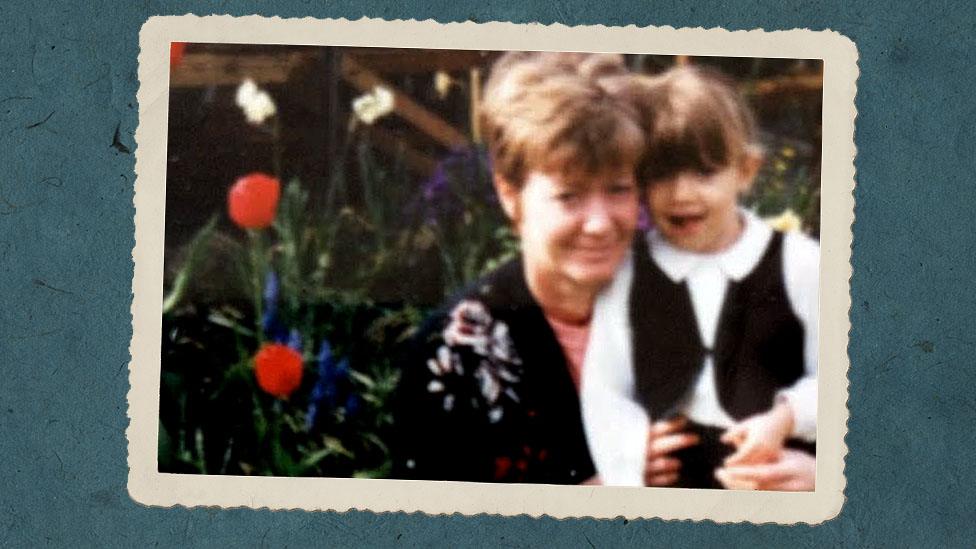
Growing up with a parent who has a drinking problem can profoundly affect children in many ways. Children of alcoholics are more likely to suffer from depression, struggle in school, and experience abuse and violence at home. Many find that they are still deeply affected by their parent's drinking as adults - like Becky Ellis Hamilton.
It was Saturday night and 13-year-old Becky was helping her mum, Pat, get ready to go out. Pat spent most weekends at her partner's flat up the road, leaving Becky at home with her grandmother.
In the bathroom, Pat perched on the lid of the toilet while Becky delicately put her contact lenses in for her, then softly brushed lilac eye shadow across her mum's eyelids and rolled a pearlescent pink lipstick around her mouth.
"I'd do her make-up whatever way I thought was cool at the time," Becky says, "and she would just go with it."
Pat was tall and beautiful and looked young for 53, Becky says. She was upbeat that night, trying to laugh and joke and mess around.
"But I remember being quite grumpy with her," Becky says. "I felt so frustrated. I just wanted to say, 'I know you've been drinking - why have you had a drink now? You've not drank in ages.'"
But she didn't say anything. And with her make-up complete, Pat kissed Becky goodbye and left.

From a very early age Becky knew that her mum was a drinker, even though Pat never drank in front of her and never talked about it.
There was a smell that lingered around her mother that Becky still remembers, the smell that seems to seep out of the pores of someone who's had a skinful the night before. And often she had a look about her too, Becky says.
"You could tell straight away - she just changed, it was as though as soon as she started drinking she kind of checked out."
Pat would hide bottles of vodka around the house - under the mattress, between towels in the bathroom cupboard, in the toilet cistern. She'd down it in secret, and was drinking heavily on as many as five days out of every seven. So if Becky ever found one of her mum's stashed bottles she'd pour the vodka away, replace it with water and then carefully return the bottle to its hiding place. But neither of them ever talked about it.
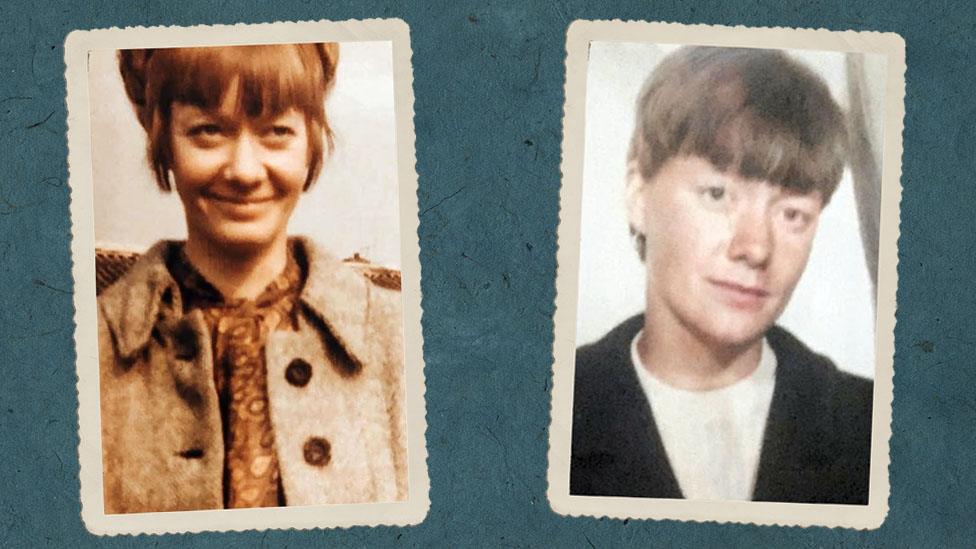
Pat as a young woman
There was an unspoken rule in Becky's family about her mother's drinking - you didn't mention it to anyone.
"I didn't want to get my mum in trouble. I was afraid if anyone found out they'd take me away and I knew that my mum needed me," Becky says. "It was my responsibility to protect her - if I hadn't been there my grandma couldn't have coped."
Becky didn't even confide in her closest friends about what was going on at home, and would only invite mates over for sleepovers on weekends when her mum was away.
"It was kind of tactical," she says, "it was an arrangement that hadn't been discussed, but one that suited everyone."
In fact, the only people Becky ever heard talk about the drinking problem were her grandmother and her half-sisters - Pat's children from her first marriage, much older than Becky, who had stayed with their father after the separation.
"I think my grandma was ashamed - not of my mum - just of the stigma of it. No-one knew what to do with my mum and there just wasn't the support there like there is now," Becky says.
"My mum was an alcoholic and it was a massive secret."

Children of Alcoholics Week
Children of Alcoholics Week, external is a campaign to raise awareness of the hidden problem of children affected by parental alcohol problems
Marked internationally, this year it runs between 14-20 February

Becky grew used to Pat's erratic behaviour - finding her mum vomiting or unconscious wasn't unusual.
And she got used to the disappointments. One evening she and her gran turned up to collect Pat from her work at the underwear shop to go and see the Christmas lights switched on - but Becky's excitement soon dissolved when she saw the look in her mum's eyes, and heard her slurring her words.
Sometimes, on her grandmother's bingo nights, Becky would find herself alone with her mother after school and would do whatever she could to try to keep her mum's mind off drink.
"I was constantly worrying and constantly on edge really, because once she'd have a drink that was it - that was me on guard, looking after her all night," Becky says.
If Pat realised there wasn't any alcohol in the house she'd ask Becky to come for a walk to the shop with her.
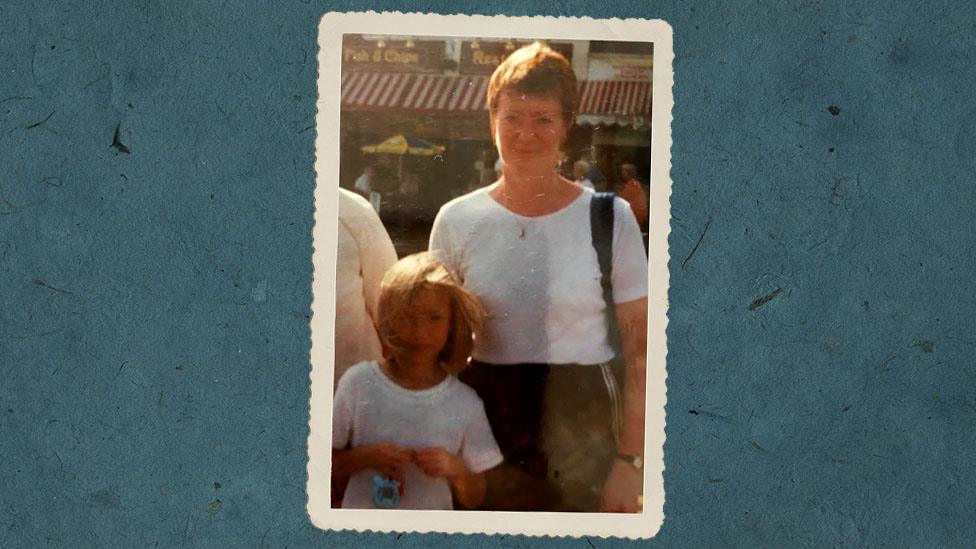
Becky aged about six, on a day-trip to Skegness with her mum
"And we'd get half-way back and she'd say, 'Oh, I've forgotten something, just wait here,' and I knew that she was going back for alcohol," Becky says.
When Pat was drunk she'd cry, tell Becky that she just wanted to be loved, and go over all the bad things that had happened to her. Becky would sit and listen, and reassure her mum that she loved her. It would get late, and Becky would try to persuade her mum to go to bed.
"When we lived at my grandma's, me and my mum shared a bedroom, so I'd have to get into bed with her and wait till she fell asleep - then I'd sneak out and ring my sister on the phone in the hallway," she says.
But if Pat woke up and realised Becky wasn't there she'd get upset.
"She'd start crying and saying, 'You don't love me,' and 'You're going to leave me,' and then I'd have to creep back into bed and start all over again," Becky says.
Eventually, Pat would fall asleep or pass out. But even if it was really late and she was tired, Becky would feel too uneasy to sleep herself. From time to time she'd hold a small mirror up to her mum's face, just to check that she was still breathing.

The morning after a session, still smelling of alcohol, Pat would act as though nothing had happened.
"She would give me a hug if she knew she'd done something wrong, had upset me, or something dramatic had happened the night before," Becky says. "That was her way of acknowledging what she'd done without addressing it. It was bizarre, to be honest, it was like she was a different person."
When she was sober, Pat was "the most amazing, perfect mum," Becky says, "so kind and funny, and fun". And there were periods when she'd do relatively well cutting back - but no matter how many stints she had in rehab clinics (when Becky was told her mum was "going to stay at a friend's"), or how much willpower she mustered to stay off the drink, Pat couldn't seem to chase away the demons that led her to self-medicate.
"When she was drunk she would tell me about how she was abused [as a child]," Becky says. "And she told us who it was - it was someone in the family."
Sometimes things would just get so much for Pat that she'd try to end it. Becky remembers at least three suicide attempts while she was growing up, and thinks her mum had likely tried a good few times before she was born.
"I'm sure there were more - Mum would just get to a point of desperation," she says.
One evening, when Becky was still really young, probably not even five, her half-sisters were visiting for the weekend and Becky's dad had gone out.
"Mum had started drinking, got herself in a state, and disappeared with a load of tablets," Becky says. "We couldn't find her so my sisters went to find my dad. Then I remember them putting me in my doll's pram, and my dad saying, 'Take her to your grandma's,' and us walking to the house in the dark and seeing an ambulance."
Pat was eventually found lying on a park bench and rushed to hospital. When she was discharged, no-one explained to Becky what had happened, or said anything about it at all.

Parents drinking in lockdown - what children say
"I am in lockdown with both parents who drink too much and my dad is becoming more aggressive."
"My mum has always struggled with her drinking. Since the start of the pandemic she is no longer [attending] AA meetings and is drinking more than I have ever known her to."
"When he's drunk he scares me. He has no concern for us at all and my mum suffers most. If my mum divorces him we would lose our house, but we are unhappy so what should we do? I wonder if it's us, having a family seems to pressure him."
"The whole coronavirus situation has led to her ordering huge crates of beer and wine. There is no escape and I'm more trapped than ever."
"The only source of income she's got is Dad giving her money. It's unfair on him because he works so hard and all she uses the money for is alcohol. I've told him not to give her any money because he's feeding her addiction, but I know he's only doing it because otherwise she'll give him a hard time."
"Covid-19 affects everything. I drink with mum now, it's the only good times we have."
Quotations from children who called the National Association of Children of Alcoholics, external telephone helpline (0800 358 3456)

Although her parents' marriage hadn't lasted the course and her mum hadn't completely stopped drinking, by the time Becky was 13, it seemed like things were improving. Pat had a nice, new partner and she wasn't drinking as much - sometimes only at weekends, when she was at Brian's.
"I've more happy memories of her in that period of time," Becky says, "I think meeting him - someone that genuinely did care about her, and me and my grandma - gave her more of a reason to try."
On a good day - when she'd managed not to have a drink - Pat would draw a tick in her diary.
"We didn't speak about it," Becky says, "but I remember reading it and counting to 10, and being so happy that finally, Mum was getting better. I thought, 'Yes! She's cracked it.'"
But then something changed. The ticks in the diary changed to question marks. Pat was drinking again.

That Saturday night, after Becky had finished doing her mother's make-up, Pat set off for Brian's house. It's possible she drank more on the way, Becky says, as Brian told her to sleep it off and went out alone.
The following morning, at about six or seven o'clock, the phone rang, and Becky was woken by her grandmother.
"Becky! Get up! Your mum's done herself in," she was shouting, over and over. "Get up! Your mum's done herself in."
Becky ran straight out of the house, towards Brian's. She stopped in the street when she saw the ambulances. She didn't have any shoes on and was only wearing her night dress.
"It was like some kind of dream," she says. "But I knew this was going to happen, I'd been preparing myself."
Pat had collapsed in Brian's flat, and suffered major organ failure, dying "pretty much instantly", Becky says.
Pat had extremely high levels of alcohol in her bloodstream, and a coroner recorded a verdict of accidental death.
"This sounds awful, but you get a bit numb to it because you've had to put on this brave face since being a kid," Becky says. "It's like you don't really feel things any more. It's sad, but that was my reality."
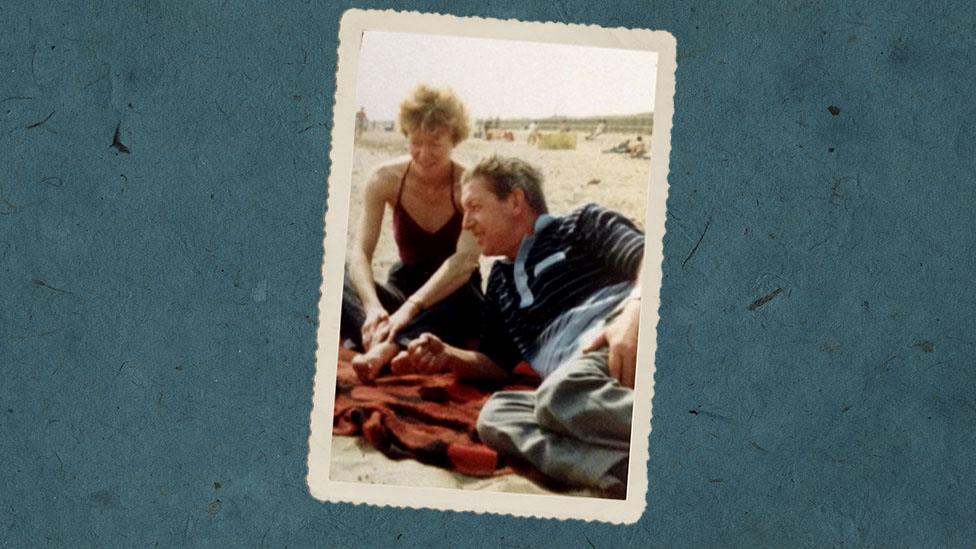
Pat did her best to drink less after meeting Brian
The local newspaper, the Scunthorpe Telegraph, published a story about Pat's death soon afterwards.
"None of my friends knew a thing until she died, but that put me in a position where I was forced to accept that we had this massive secret that I'd thought was just normal," Becky says.
When she went back to school, everyone knew.
"I was bullied a bit, and I heard some really awful jokes about my mum and how she died, and people saying that it was my fault," she says.
"My mum had gone, I had completely lost my identity - this secret life I'd had and all the pretence I'd been living through was gone. Everyone knew everything and I just didn't know who I was."
Becky says there was a lack of structured support from her school.
"I had one teacher who pulled me to the side one day and asked me what was going on - so he was always who I'd go to if I started feeling down," she says.
The day that Becky had a meltdown in her maths lesson that teacher knew exactly what was going on - it was the first anniversary of her mum's death - but Becky really needed more than a sympathetic ear.
"I didn't know how to cope or what to do. I just couldn't process it, it was awful," she says.
"Everything had been centred around taking care of Mum and now she was gone."

Years later, Becky is still coming to terms with losing her mother. She feels frustrated about the "toxic silence" that surrounded both the abuse Pat experienced as a child and her later alcoholism. But she doesn't blame anyone.
"It was a generational thing back then," Becky says. "It brought shame to your family if you spoke about things like that."
Becky now wishes she'd spoken to her mum or sought help for her elsewhere.
"Probably my one regret is that I didn't," she says. "At the time I daren't because I had it programmed into me that if I talked to her about it, it would just get worse. But if I'd spoken to someone outside the family circle, I'd maybe have had the strength to talk to her and talking might have been all that was needed."
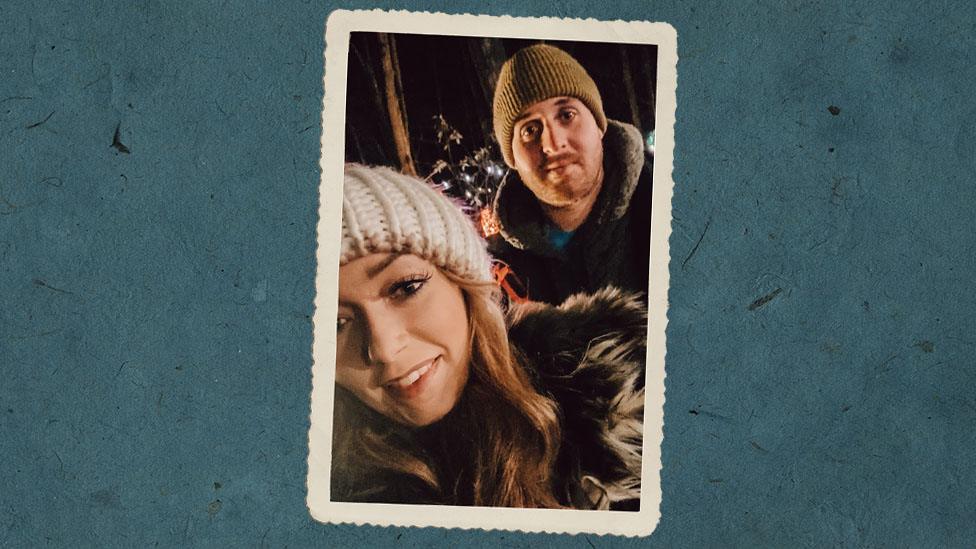
Becky and her husband, Jay
It's nearly 18 years since Pat died, and being around drunk people still makes Becky feel uncomfortable.
"I get scared and then I get very controlling because I feel like I've got to take on that motherly role," she says. "I can't relax or stop checking on them, I'm hyper aware."
Two years ago, on the eve of her wedding, Becky's boyfriend Jay was celebrating with a few drinks.
"And I realised how triggering it was for me and let it ruin the next day," Becky says.
Jay hasn't really drunk alcohol since - "he's been amazing," Becky says. And since November last year, Becky's also given up alcohol - she was never that much of a drinker, but always had a fear, at the back of her mind, that she might end up like her mother.
Not long after her mum died Becky was diagnosed with bipolar disorder, and although she always took her medication she wasn't really taking care of herself. Then two years ago, around the time of her marriage to Jay, she realised she needed help, both for depression and to enable her to process the trauma she'd experienced growing up.
Through her own research she discovered organisations that support people who've grown up with alcoholic parents.
"I thought I was the only person to find bottles of vodka in the toilet cistern until I found this community and spoke to people who've been in the same position," she says, "it was a weight off my chest."
Becky now has a network of people she can talk to who empathise with her childhood experiences, and she's discovered a new purpose through training to support addicts on their own recovery journeys.
"I've found myself and my confidence has grown," Becky says.
"My mum would have wanted me to do whatever makes me happy - and what makes me happy is helping people like her."
For sources of support in connection in with issues raised in this story, please visit the BBC Action Line
You may also be interested in:
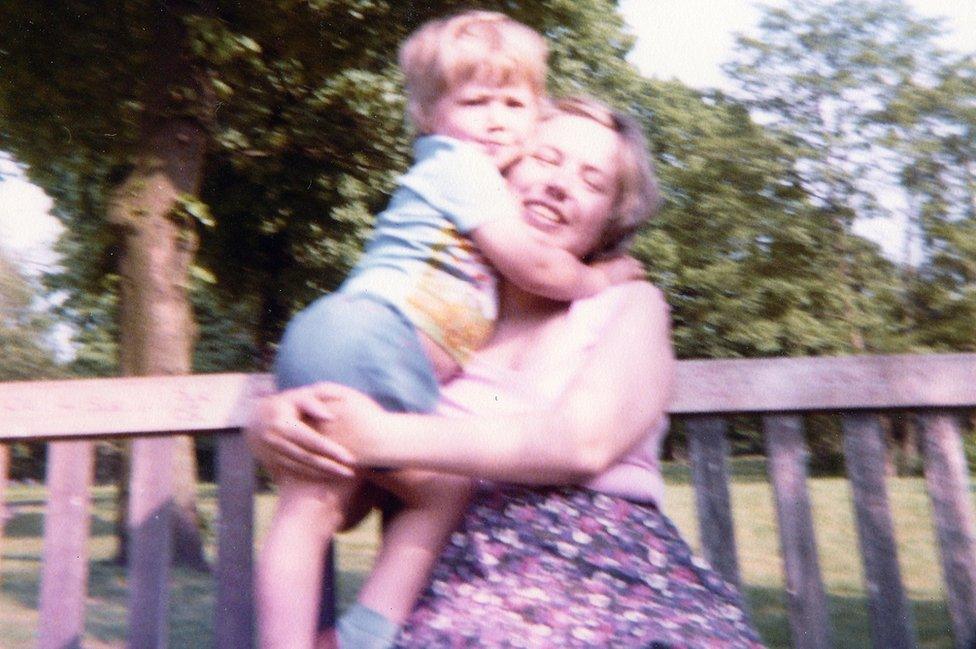
Iain Cunningham always believed that his birth had something to do with his mother's death, but whatever it was seemed to be a family secret that couldn't be discussed. It wasn't until Iain was an adult with a family of his own that he uncovered who his mother really was and why she had died.